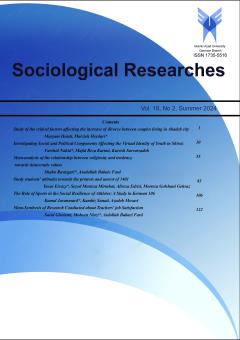Meta-analysis of the relationship between religiosity and tendency towards democratic values
Subject Areas :
Shaho Rastegari
1
*
,
اسداله یابایی فرد
2
![]()
1 - Doctoral student of social issues of Iran, Kashan University, Kashan, Iran.
2 - استاد دپارتمان جامعه شناسی دانشکده علوم انسانی، دانشگاه کاشان
Keywords: Religiosity, democracy, meta-analysis, religious identity, effect size,
Abstract :
The present research has been done with the aim of using meta-analytical statistical method in order to analyze the results of the researches conducted in the field of the relationship between the level of religiosity and tendency towards democracy. 30 researches conducted in relation to this subject were examined, and among them 17 researches conducted between 2014 and 2018 on the relationship between the level of religiosity and tendency towards democracy, which were published in authoritative scientific journals. were chosen. The mentioned researches have been carried out using the survey method in different statistical communities and based on reliable measures. In the first step of evaluating the selected studies, the assumptions of homogeneity and publication error were examined; Based on this, the findings indicate the heterogeneity of the effect size and the lack of publication bias of the studied studies. In the second step, the effect size coefficient was calculated using the second version of the CMA evaluation software. The obtained results showed that the effect size or the effect coefficient of religiosity on tendency to democracy is (0.439), which according to Cohen's interpretation system, is evaluated at a moderate level.The extent of this effect is greater among the citizens of the society than the students, and of course, in the central regions of Iran, this effect is greater than in other regions, the Iranian society is transitioning from a traditional society to a modern society, and this transition requires compliance with democratic rules and styles Iran's governance is political.

